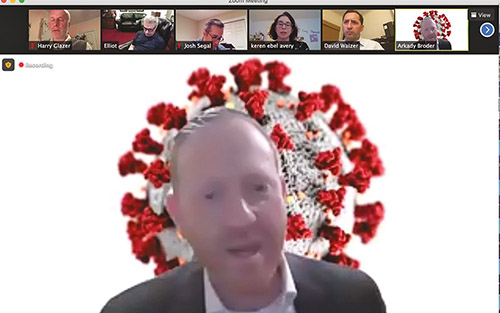




It isn’t every newly minted Jewish organization that finds a way to immediately provide essential communal services. But The ROC of New Jersey is no ordinary group.
Formed this past fall in the midst of the pandemic, the Raritan Valley Orthodox Jewish Community Association (The ROC of NJ), based in Highland Park, has quickly identified critical needs and moved deftly to address them. A “Shop Local” initiative has raised the visibility of 26 Jewish-owned businesses, all facing new struggles due to COVID-19 precautions. An employment initiative has paired 35 people who are out of work with mentors and provided other support.
And in their premier event, The ROC took on an issue of paramount communal concern—the COVID-19 vaccine and its impact on the community. Over 300 people watched a Zoom panel discussion held on January 17, which featured four respected area physicians, each offering a unique perspective on the vaccine and its potential effects in the community.
After a welcome from Josh Pruzansky, founder, president and CEO of The ROC of NJ, Highland Park Mayor Gayle Brill Mittler offered remarks. She thanked The ROC of NJ for sponsoring the event and urged viewers to learn as much as they can about the virus and how to handle it. She pointed out that about 4.5% of Highland Park residents have contracted the virus and thanked the many people who have been following recommendations to wear masks, wash hands and stand socially distant, for keeping that number low. She announced a new initiative to seek volunteers to help seniors register to receive the vaccine, and invited people to help.
Dr. Elliot Frank, infectious disease specialist and medical director at the Jersey Shore University Medical Center, presented on the topic “Are the Vaccines Safe?” Using a slide presentation, he explained how ethics in vaccine research have become firmly rooted over the past century. The COVID-19 vaccines currently being used have involved a large number of people in clinical trials—43,548 for the Pfizer vaccine and over 30,000 for the Moderna vaccine—and both vaccines demonstrated efficacy of over 94%, a very high rate.
Frank stated that the messenger RNA in the vaccines does not enter the cell nucleus, so they cannot alter a person’s genetic code, and they contain no preservatives or adjuvants. He added that while the vaccines are safe, they may not be pleasant, as some who have received them report injection-site pain, fatigue, headaches and other symptoms. These temporary side effects are far outweighed by the benefits of the vaccine.
Dr. Josh Segal, an OB-GYN, addressed “Vaccines and Pregnancy,” listing the risks that pregnant women who contract COVID-19 face, including increased chances of blood clots, pneumonia, long-term effects and hospitalization. While he acknowledged that “it is difficult to say that all pregnant women should get the vaccine,” he noted that the American College of Obstetricians (normally very cautious in making recommendations) has suggested that pregnant women should consider it. He raised the concerns that he’s heard that some who get the vaccine may become infertile and said flatly, “It never happened … It is ridiculous to assume the vaccine would have this effect.”
Dr. Kren Ebel Avery, a pediatrician, addressed “Vaccines and Children,” and said that she strongly recommends vaccines and that the health benefits are very clear. She noted that the COVID-19 vaccines are still being studied for use in children and that, in general, vaccines for children go through added levels of study. She stated that there it is very unlikely that the COVID-19 vaccine will post any risk to nursing children (if the mother receives it).
Dr. Arkady Broder, chair of gastroenterology and hepatology at Robert Wood Johnson/Saint Peter’s Healthcare, spoke about “The COVID-19 Vaccine and the Immunocompromised.” He shared that current data shows that immunocompromised people “are at greater risk for severe effects and complications” from COVID-19. Preliminary data shows that those who are immunocompromised are at no increased risk if they take the COVID-19 vaccine. He recommended that immunocompromised people, in consultation with their personal physician, consider taking the vaccine.
“The ROC of New Jersey was established to help individuals, families, businesses and institutions and to promote and grow our communities of East Brunswick, Edison and Highland Park,” said Pruzansky.“Providing this informative and important Zoom event about the COVID-19 vaccine to the community is exactly what we had in mind. To bring together local medical professionals who are leaders in their fields, who explained the importance of getting vaccinated as individuals and as a community, to help eradicate this terrible pandemic and return to life as normal, is truly our mission.”
“I want to thank The ROC for organizing this amazing panel discussion,” said Miryam Gordon of Highland Park. “They really helped me gain a better understanding of the necessity of getting the vaccine as soon as it is available to me.”
“The highlight of the presentations was Dr. Josh Segal’s candid discussion of vaccination safety in pregnancy, which left my husband and I tearing up with laughter,” said Hava Freidenreich of Highland Park. “Josh Segal knows how people get pregnant and assured us that the vaccine should not affect fertility.”
“This was a very informative event, which benefited the entire community,” said Rosa and Barry Katz of Highland Park. “We found the presentations to be clear, concise and full of useful information. We also appreciated the mayor’s participation and her request for volunteers to help seniors in our town to sign up for the vaccine. We applaud the work of this new organization and look forward to future events.”








